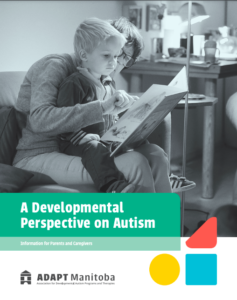What Are Developmental Therapies?
Developmental autism therapies are all about building the ability of parents to understand, emotionally support, interact with, and guide their children. The goals and strategies in these therapies are different in focus from those used in behavioural therapies, and they are effective for the goals that they set.
A Different Perspective
Developmental therapies use information about stages in social connection and communication to support children’s growth, using strategies like modeling, collaboration and play to invite and engage children in interactive learning.
As you might expect, behavioural therapies tend to focus on behaviours, knowledge, and skills that are easy to measure. In contrast, developmental therapies focus on learning HOW to learn. Rather than repeated practice on particular skills until they are mastered, learning occurs in the context of everyday activities. Variety, creativity and problem-solving opportunities are important to push the child out of their comfort zone and stretch their thinking. Learning specific skills and ideas is valued, but that is a downstream effect of a developing ability to respond to the unexpected, learn from and with others, contribute ideas, and interact socially in increasingly complex ways.
Assessment is different with developmental therapies. Instead of keeping a checklist of tasks a child can do, the child’s style of interaction is observed. Do they watch and imitate in a back and forth way? Can they work together with others to complete a task? Can they contribute ideas and build on what someone else is doing? Can they manage their emotions in times of stress and challenge? One example illustrating this difference is doing puzzles – in a behavioral program, the therapist might have the goal that a child can complete a 20-piece puzzle by themselves. To break the task down, the child might start when there is just one piece missing, then when five are missing, then half…until they can complete the puzzle from start to finish by themselves. In a developmental program, the goal would be to enjoy doing the puzzle together as a social activity, taking turns, talking to each other about what colors are needed, perhaps even playing games with the pieces. The goal is to enjoy interacting over an activity, while building communication, fine motor and visual skills as a side benefit, as any child would do.
Usually developmental therapies are carried out by parents, who are trained to work with their children under the guidance of therapists in the natural environment of the home. This type of therapy is less costly than therapies that hire tutors to work 1:1 with children, and leads to a reduction of stress in parents. An intensive level of intervention is achieved because parents can make every interaction with their child an opportunity to learn.
A strength of developmental therapies is that it can be done in regular family settings – a child can stay with the people he would normally be with, and it’s easy to teach family members and friends how to help. He doesn’t have to be isolated with a single therapist for long periods of time, and there are no tokens or reward system. Learning looks like normal family activity – we believe that the journey should look like the destination.
Developmental therapies can be used by themselves, or as a part of a a multifaceted therapy approach.
An Effective Approach
Developmental therapies are based on understandings of how children learn from both psychology and education. Speech and language pathology and occupational therapy also contribute to knowledge and strategies used in developmental therapies.
Because developmental therapies are carried out through everyday interactions, there is no age limit. Strategies can be adjusted to fit a person’s age and interests. With older children, the context for interacting can be household chores, hobbies or interests, or just joking around.
Parent Implemented Interventions are recognized as evidence based by the National Professional Development Center, and research support for developmental therapies is building.
Some examples:
- DIR/Floortime
- PLAY Project
- Relationship Development Intervention
- Hanen
For an explanation of each, take a look at our brochure, which is also available in printed form upon request.

